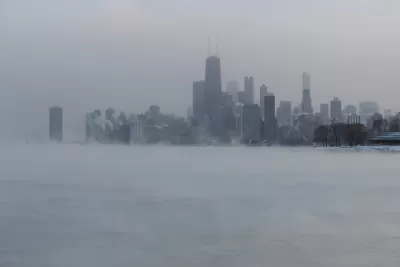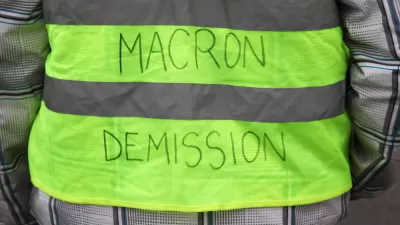Michigan Gov. Gretchen Whitmer has followed the path laid by New Mexico Gov. Michelle Lujan Grisham and Illinois Gov. J.B. Pritzker in joining the U.S. Climate Alliance. All three are new Democratic governors replacing Republican predecessors.

“We’ve got to take action to protect our state from the effects of climate change," stated Governor Gretchen Whitmer in Lansing on Feb. 4. "The science is in, and it’s time we get to work to mitigate the impact of climate change for the sake of our kids and future generations in Michigan.”
Whitmer's "Executive Directive 2019 - 12" directs the state to meet the three requirements for membership in the U.S. Climate Alliance, a group formed by New York Governor Andrew M. Cuomo, California Governor Edmund G. Brown Jr., and Washington State Governor Jay R. Inslee in the wake of President Trump's June 1, 2017 announcement that he would withdraw the U.S. from the Paris Climate Agreement:
- Implement policies that advance the goals of the Paris Agreement, aiming to reduce greenhouse gas emissions by at least 26-28 percent below 2005 levels by 2025.
- Track and report progress to the global community in appropriate settings, including when the world convenes to take stock of the Paris Agreement.
- Accelerate new and existing policies to reduce carbon pollution and promote clean energy deployment at the state and federal level.
On Jan. 23, Illinois Governor J.B. Pritzker, who defeated incumbent Gov. Bruce Rauner (R) last November, joined the Alliance. On Jan. 29, New Mexico Governor Michelle Lujan Grisham, who succeeded retiring Gov. Susana Martinez (R), joined the alliance. Gov. Whitmer defeated Republican Attorney General Bill Schuette to succeed Gov. Rick Snyder (R).
Among the three states joining the U.S. Climate Alliance, Michigan may be the most challenged in meeting the three membership requirements from a political perspective – unlike New Mexico and Illinois, which are now Democratic trifectas, both the House of Representatives and Senate are controlled by Republicans.
Dan Gearino of InsideClimate News reports on the trend, as well as two other executive orders signed by Gov. Whitmer on Monday.
"We see this as part of a larger trend we're seeing across the country with new governors who ran on climate, who ran on transitions to 100 percent clean energy," said Sara Jordan, manager of the League of Conservation Voters' Clean Energy for All campaign. "I think you're seeing a lot of these governors not wanting to be left behind in this transition."
In addition to the directive to join the Climate Alliance, Whitmer signed two executive orders to restructure the Department of Environmental Quality, the agency tarnished by its role in the Flint water crisis, as the Department of Environment, Great Lakes, and Energy, and to protect drinking water from per- and polyfluoroalkyl substances, known as PFAS.
“This is about finding real solutions to clean up our drinking water so every Michigander can bathe their kids and give them a glass of water at the dinner table safely,” said Whitmer.
Related in Planetizen:
-
State Gubernatorial Elections Have Environmental Consequences, November 1, 2018The environment and climate change may not be top issues in the nation's hotly contested gubernatorial contests next Tuesday, but their outcomes can cause policy changes.
-
Let the Climate Resistance Begin, June 6, 2017States and cities are reacting to President Trump's withdrawal from the Paris Climate Agreement on Thursday. Three states formed the U.S. Climate Alliance; by Monday, it had grown to 13.
FULL STORY: Michigan's New Governor Puts Climate Change at Heart of Government

Maui's Vacation Rental Debate Turns Ugly
Verbal attacks, misinformation campaigns and fistfights plague a high-stakes debate to convert thousands of vacation rentals into long-term housing.

Planetizen Federal Action Tracker
A weekly monitor of how Trump’s orders and actions are impacting planners and planning in America.

In Urban Planning, AI Prompting Could be the New Design Thinking
Creativity has long been key to great urban design. What if we see AI as our new creative partner?

King County Supportive Housing Program Offers Hope for Unhoused Residents
The county is taking a ‘Housing First’ approach that prioritizes getting people into housing, then offering wraparound supportive services.

Researchers Use AI to Get Clearer Picture of US Housing
Analysts are using artificial intelligence to supercharge their research by allowing them to comb through data faster. Though these AI tools can be error prone, they save time and housing researchers are optimistic about the future.

Making Shared Micromobility More Inclusive
Cities and shared mobility system operators can do more to include people with disabilities in planning and operations, per a new report.
Urban Design for Planners 1: Software Tools
This six-course series explores essential urban design concepts using open source software and equips planners with the tools they need to participate fully in the urban design process.
Planning for Universal Design
Learn the tools for implementing Universal Design in planning regulations.
planning NEXT
Appalachian Highlands Housing Partners
Gallatin County Department of Planning & Community Development
Mpact (founded as Rail~Volution)
City of Camden Redevelopment Agency
City of Astoria
City of Portland
City of Laramie




























